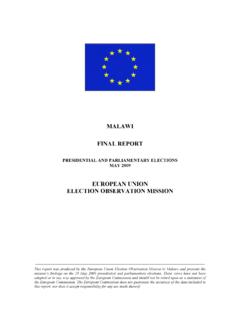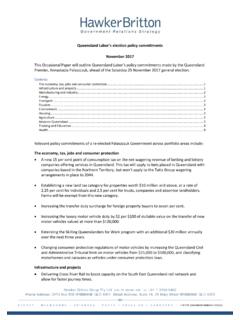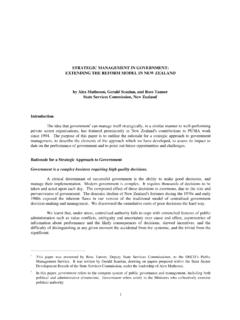Transcription of COMMISSION OF THE EUROPEAN COMMUNITIES Brussels, …
1 COMMISSION OF THE EUROPEAN COMMUNITIESB russels, (2001) 252 finalCOMMUNICATION FROM THE COMMISSIONTO THE COUNCIL AND THE EUROPEAN PARLIAMENTTHE EUROPEAN UNION'S ROLE IN PROMOTING HUMAN RIGHTS ANDDEMOCRATISATION IN THIRD COUNTRIES2 TABLE OF more coherent and consistent EU approach .. human rights and democratisation into dialogue and cooperation .. with third and bilateral dialogues, and partnership and co-operation agreements .. to dialogue .. with civil society .. 'Mainstreaming' the promotion of human rights and democracy in EC EUROPEAN Initiative for Democracy and Human Rights (EIDHR).
2 Added value of a strategy for the EIDHR .. Priorities .. Focus .. with the United Nations and other international EUROPEAN Human Rights Agency?.. 21 Annex 1 Dialogue arrangements with geographical regionsAnnex 2 Action PointsAnnex 3 List of EUROPEAN COMMISSION (EC) has adopted a number of Communications relating to humanrights and democratisation in the last decade1. This Communication does not seek to rewritethe fundamental policy. Rather it seeks to set this policy in the context of the COMMISSION 'soverall strategic approach in external relations for the coming years.
3 Changes in the externalenvironment, as well as internal COMMISSION reforms, require a re-focussing of human rightsand democracy strategies, in particular to ensure that these issues permeate all Communitypolicies, programmes and projects. Prioritisation, focus, delivery and impact are the mainthreads running throughout the document. The COMMISSION wants to be judged on itsperformance in meeting the EU's policy goals. This Communication outlines a way basis for EUROPEAN Union (EU) action is clear.
4 The EUROPEAN Union seeks to uphold theuniversality and indivisibility of human rights - civil, political, economic, social and cultural -as reaffirmed by the 1993 World Conference on Human Rights in Vienna. The EU alsoupholds the principle that the human rights of women and the girl-child are an inalienable,integral and indivisible part of universal human rights, as reaffirmed by the 1995 BeijingDeclaration and Platform for Action. The protection of such rights, together with thepromotion of pluralistic democracy and effective guarantees for the rule of law and the fightagainst poverty, are among the EUROPEAN Union s essential objectives.
5 The Treaty ofAmsterdam - which came into force on 1 May 1999 - reaffirms in its Article 6 that theEuropean Union is founded on the principles of liberty, democracy, respect for human rightsand fundamental freedoms, and the rule of law, principles that are common to the MemberStates and emphasises in article 49 that the respect of these principles also is required bycountries who apply for EU membership. It also introduced, in Article 7, a mechanism tosanction serious and persistent breaches of human rights by the EU Member States.
6 Thismechanism was further reinforced by the Treaty of Nice concluded in December 2000. Thisalso extended the objective of promoting the respect of human rights and fundamentalfreedoms, from development co-operation to all forms of co-operation with third countries(Art. 181bis TEC).The COMMISSION s action in the field of external relations will be guided by compliance withthe rights and principles contained in the EU Charter of Fundamental Rights which wasofficially proclaimed at the Nice Summit in December 2000, since this will promotecoherence between the EU s internal and external approaches.
7 The Charter makes theoverriding importance and relevance of fundamental rights more visible to the EU s citizensby codifying material from various sources of inspiration, such as the EUROPEAN Conventionon Human Rights, common constitutional traditions, and international EUROPEAN Union is well placed to promote democracy and human rights. It is continuallyseeking to improve its own democratic governance, and the COMMISSION will shortly adopt aWhite Paper on the theme. Uniquely amongst international actors, all fifteen Member Statesof the Union are democracies espousing the same Treaty-based principles in their internal and1 The EUROPEAN Union and the External Dimension of Human Rights Policy, COM (95) 567 final; TheInclusion of Respect for Democratic Principles and Human Rights in Agreements between theCommunity and Third Countries, COM (95) 216 final.
8 Democratisation, the Rule of Law, Respect forHuman Rights and Good Governance: the Challenges of the Partnership between the EUROPEAN Unionand the ACP States, COM (98) 146 final and Countering Racism, Xenophobia and Anti-Semitism in theCandidate Countries, COM (99) 256 final. Communication on EU Election Observation and AssistanceCOM (2000) 191 policies. This gives the EU substantial political and moral weight. Furthermore, as aneconomic and political player with global diplomatic reach, and with a substantial budget forexternal assistance, the EU has both influence and leverage, which it can deploy on behalf ofdemocratisation and human 1992, the EC has included in all its agreements with third countries a clause definingrespect for human rights and democracy as essential elements in the EU's relationship.
9 Thisclause is unique in bilateral agreements. This approach has been further developed in theCotonou agreement signed with African, Caribbean and Pacific (ACP) countries in June 2000which is based on respect for human rights, democratic principles and the rule of law, and ongood governance. It constitutes a major step in the development of the EUROPEAN Union shuman rights November 2000, the Council and the COMMISSION adopted an important Joint Statement onthe EUROPEAN Community's development policy2, which has been welcomed by the EuropeanParliament (EP).
10 Together with the reform of the management of external assistance itrepresents a new framework for the implementation of EC development policy. This newdevelopment policy is firmly grounded on the principle of sustainable, equitable andparticipatory human and social development. The promotion of human rights, democracy, therule of law and good governance are an integral part of reduction, the main objective of the EUROPEAN Community's development policy, willonly be sustainably achieved where there are functioning participatory democracies andaccountable governments.





